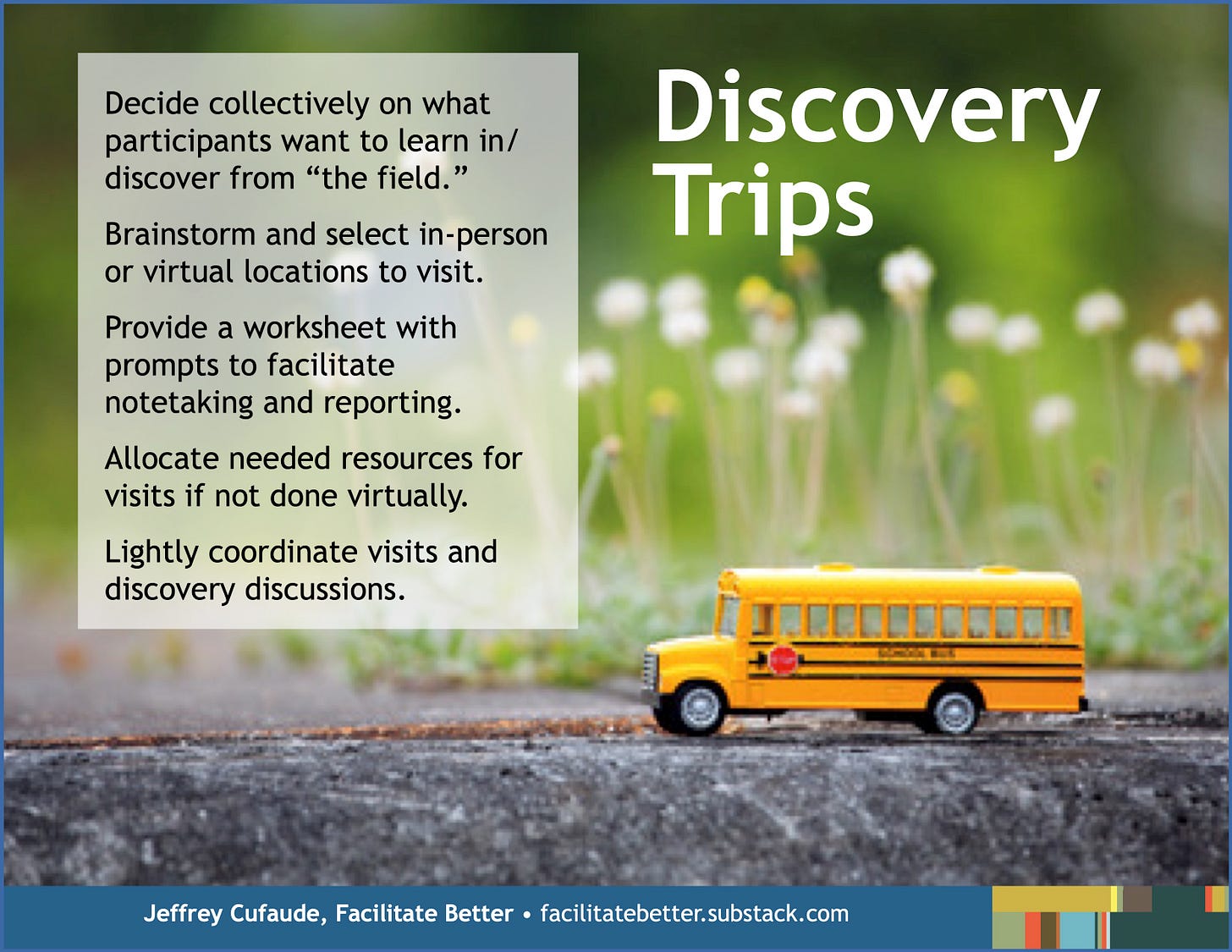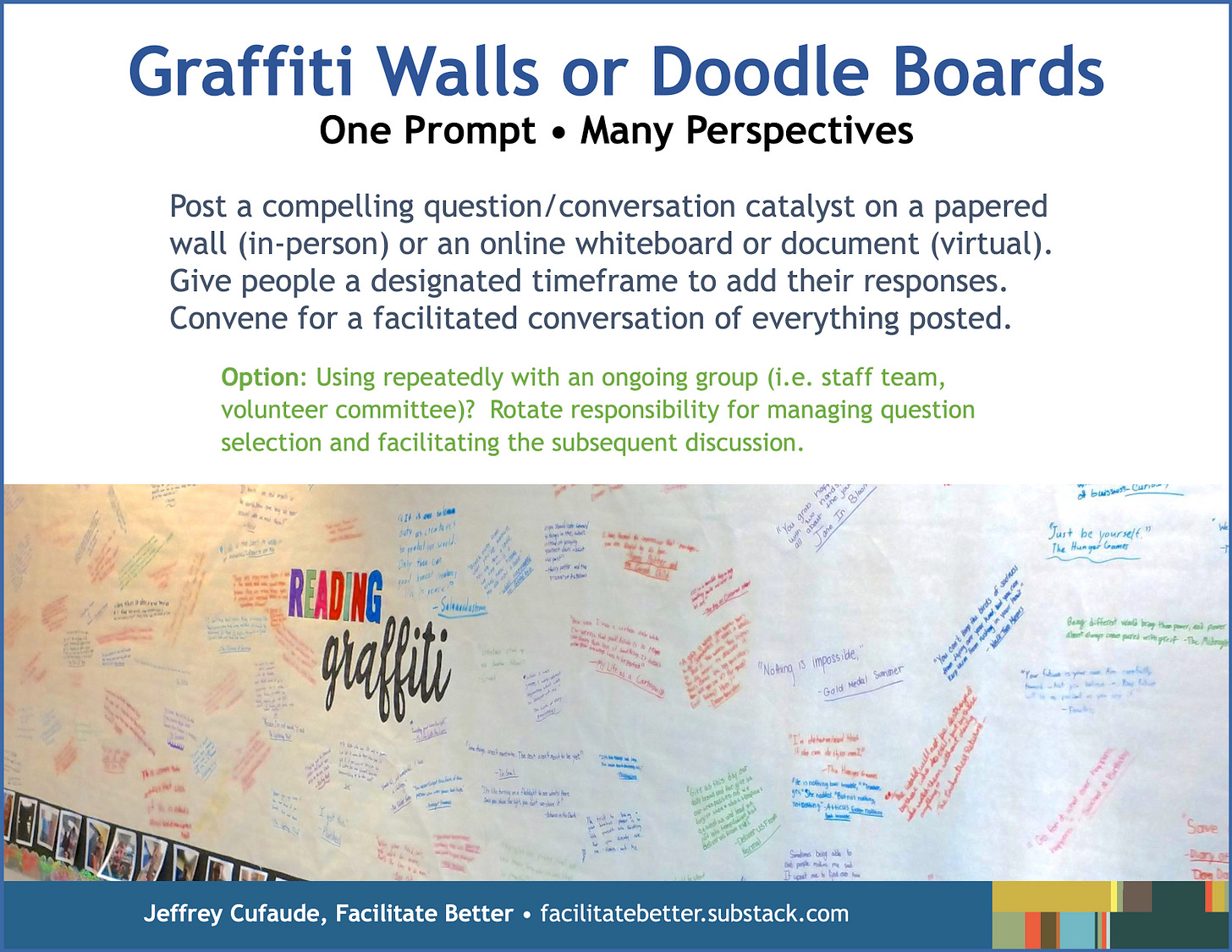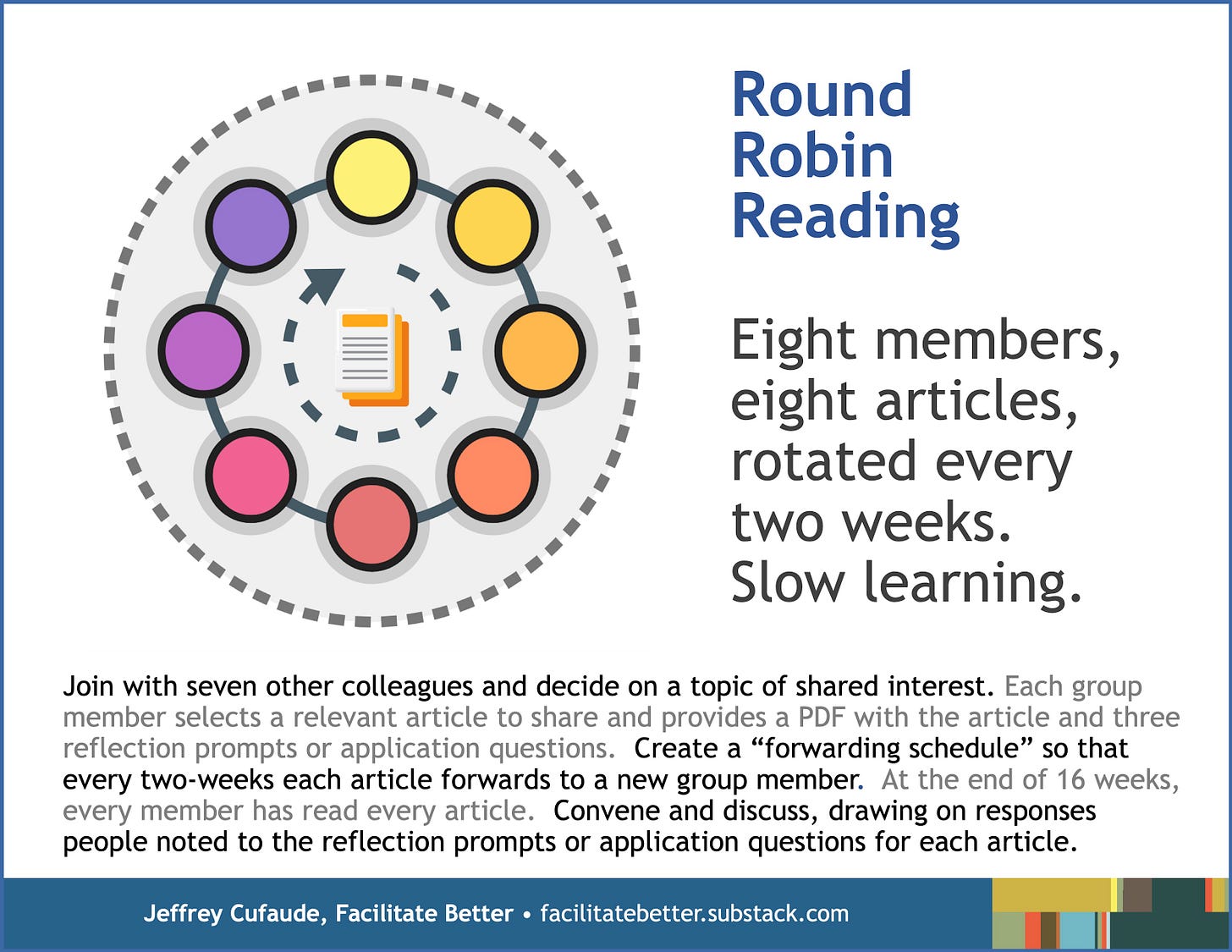Simple Formats for Better Engagement and Self-Directed Learning (Facilitation Friday #44)
Make some magic outside the formal structure of meetings, workshops, or conferences.
How might we better leverage asynchronous, self-managed activities and formats for meetings and workshops or as freestanding learning experiences?
This is the design thinking question I’ve contemplated for some time, first out of necessarily during the pandemic, and now primarily out of desirability. The goal is simple: structure experiences for people to complete on their own time, ones that generate meaningful content and insights they could share with others in meetings and workshops.
Let’s briefly explore why this question matters and possible uses for these formats and activities.
Why This Matters
The question and goal are important for better discussions, decisions, and results because:
Not everyone does their best thinking on demand, whether the setting be in-person or virtual. Providing more opportunities for people to reflect and think on their own schedule can attract better contributions and often accelerate progress.
Virtual and hybrid workers in particular have become accustomed to having more control over their time and the way they do things. Using facilitation formats that respect autonomy may get better support and engagement.
When we use formats that privilege active learning, they often can replace meeting or workshop presentation segments that would reduce participants to passive listening.
People seem to have higher expectations for what happens when they convene with others, be that an online learning experience or an in-person meeting. Leveraging offline and asynchronous work often means we can use synchronous time together in a more efficient and effective manner.
Resource constraints often limit the number of formal learning experiences that individuals and organizations can support, particularly solo entrepreneurs and organizations with small staffs.
Our content-rich world makes it easier for people to have more control over managing their own personal and professional learning outside of formal offerings.
Favorite Formats or Activities and Possible Uses
Each of the six options I highlight below scales for different size groups; can focus on almost any question, topic, or issue; privileges active learning for both introverted and extroverted learners; adapts well for subsequent use in planning processes, meetings, workshops, and conferences whether online or in-person; could be a freestanding learning experience without any subsequent requirement to convene and interact with others; and generally are fun or enjoyable.
In each format or activity, participants explore content relevant to their interests and any meeting, workshop, or planning process outcomes. The content they examine can broaden their awareness and understanding of relevant issues, questions, and perspectives. Participants also become the ambassador or expert for their individual content assignments, able to share relevant takeaways with others involved. As facilitator, your primary role is to provide sufficient structure to ensure these explorations produce meaningful results.
The six favorite formats are: Discovery Trips, Content Clubs, Learning Potlucks, Graffiti Walls or Doodle Boards, Community Catalysts, and Round Robin Reading.
Of the six, Round Robin Reading is the only one best used as a freestanding learning experience. The remaining five work as pre- or post-work for a variety of meetings, workshops, or planning sessions, as well as a standalone learning experience. Some also are appropriate for extending conversation and learning after a meeting or workshop.
Ready to take a look at each format or activity? General implementation instructions and an example of possible use are provided.
Send members of a redesign committee for an annual conference on virtual Discovery Trips, looking at other conference websites and programs. The sites/conferences you select for each trip should offer novel approaches for professional development, community-building, exhibits, and other common conference components.
Involve members of an organization’s Environmental Scanning Task Force in Content Clubs. Pair participants to serve as stewards for a topic/trend area the organization wants to monitor. Each pair is responsible for scanning assigned publications or websites, distilling relevant takeaways, and periodically joining with other task force members to share what they have discovered and to prepare recommendations for organizational leaders.
Gather people with similar job functions from different organizations for Learning Potlucks to divide and conquer the professional reading that individually could be overwhelming … similar in spirit to a college course study group. Also use these gatherings to build and strengthen their peer network.
Incorporate Graffiti Boards/Doodle Walls as part of a longer workshop. On each board post one situation that workshop participants want to learn more about how to handle. Invite people to roam freely among the posted questions/boards and note their own ideas at several points during the session. Assign each board to a small group to review responses and select three to report out to all participants.
Work with a volunteer committee or organization staff to implement Community Catalysts as a way to crowdsource ideas and content from members, customers, and/or stakeholders. Help them decide how to repurpose the responses/content generated into other formats that support the organization’s overall goals for communications, professional development, and community-building.
I formed a community of practice with several other facilitation colleagues to engage in Round Robin Reading of some thought-provoking and question-inspiring long-form articles related to our work. The leisurely pace of the process was conducive to thoughtful reflection on each reading. The diverse content and mix of colleagues produced rewarding and challenging conversations when we convened to discuss the readings.
The Key Challenge to Manage Around
The most common pitfall for any self-directed asynchronous format or activity people to complete prior to convening together for a session—and it is a significant one—is that not every participant does the work. Your choices and session design need to reflect this possibility. Be sure to:
Get participants’ upfront commitment to the approach, their associated responsibilities, and the deadlines.
Assign similar work to multiple individuals or small groups for redundancy in case someone falls short.
Provide ample time for completing the assignments and share real-time receipts of who has finished them.
Use relevant activities that don’t waste people’s time and that are enjoyable to complete whenever possible.
Incorporate the assignment or activity into the schedule of multiple-day events rather than as pre-work to complete in advance.
Bottom Line
Intentionally using asynchronous formats or activities to enable participants in meetings, workshops, or planning processes to explore content, gather ideas and insights, and share them with others aligns with many trends and participant preferences. This approach divides meaningful work into more manageable assignments for individuals involved and can leverage a more diverse array of people and perspectives. Effective facilitation provide adequate structure to ensure these activities effectively focus participants’ attention and efficiently use their time.
Getting in Action
Pick a format or activity and determine how you might effectively incorporate it into a future meeting or workshop or as a standalone learning experience.
Consider how you might need to adapt any or all of the six options so that they would resonate with the (types of) participants you most often facilitate.
Create your own asynchronous format that would offer some of the same value propositions as those outlined in this essay under the heading Favorite Formats or Activities and Possible Uses.
© Facilitate Better and Jeffrey Cufaude. All rights reserved.
To affordably license this content for reprint on your site or in electronic or print communications or to contact me regarding customized facilitation skills workshops or consultations, complete this form.







